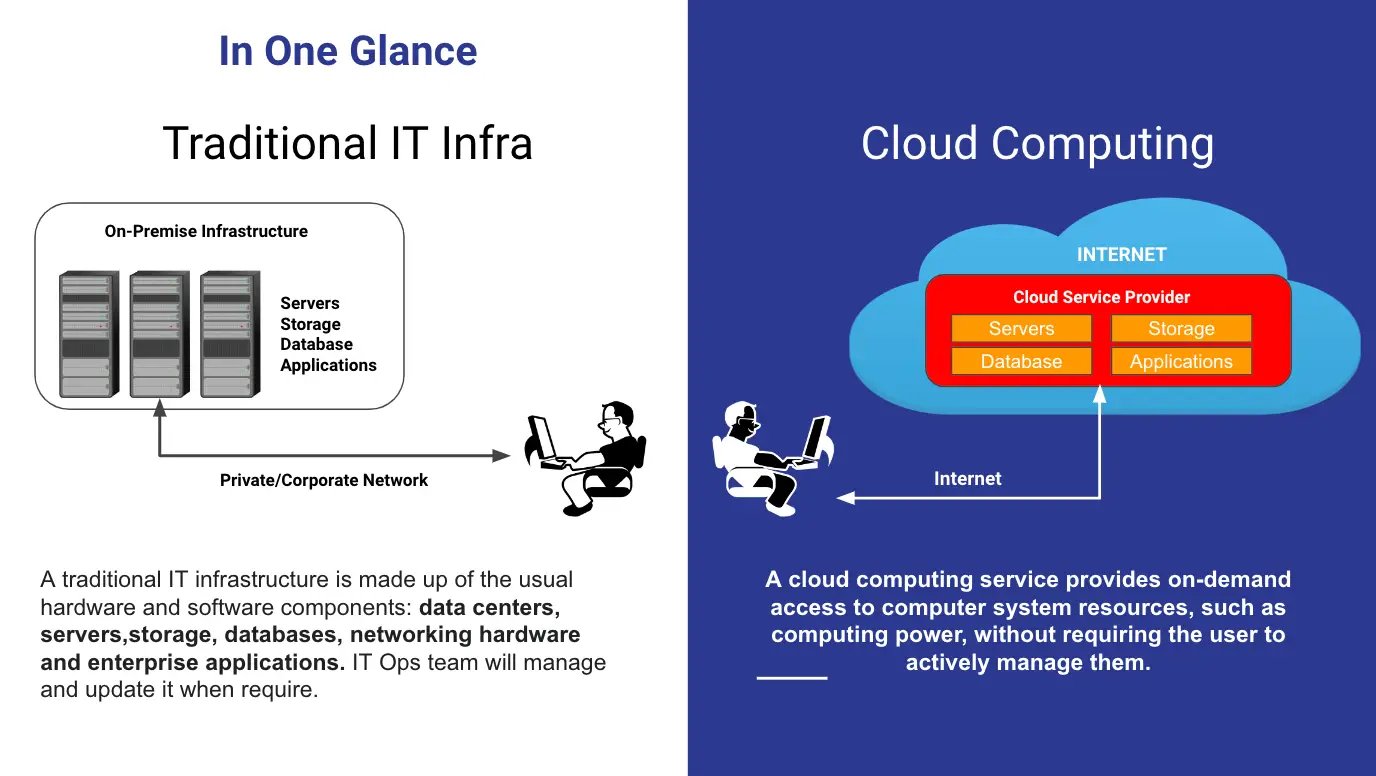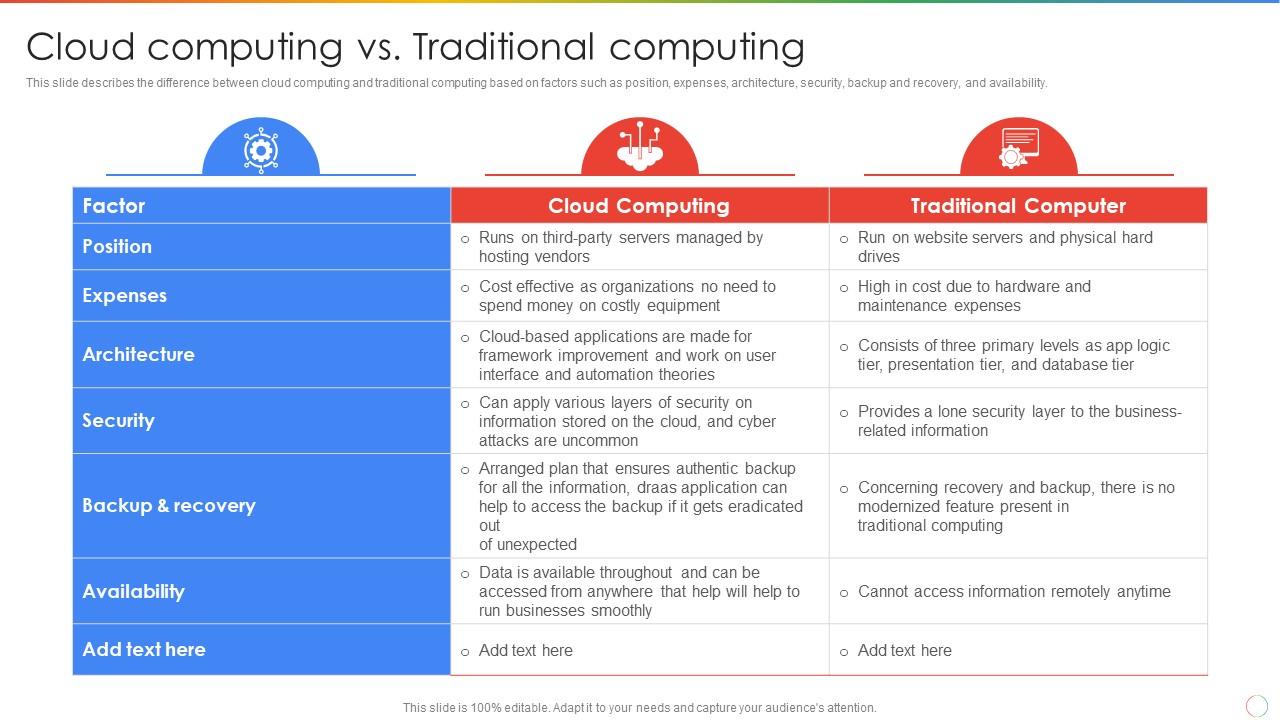Cloud computing and traditional hosting are both ways to host websites. But they work differently.
Cloud computing uses multiple servers to manage data and traffic. Traditional hosting relies on a single server. Understanding the differences between cloud computing and traditional hosting is essential for making the right choice for your business. This blog post will explore how each hosting method works, its benefits, and potential drawbacks. This comparison will help you decide which option best suits your needs, whether you want scalability, reliability, or cost-effectiveness. You will clearly understand which hosting solution aligns with your business goals by the end. For reliable and managed hosting solutions, consider checking out Liquid Web. They offer a range of services, including cloud hosting, dedicated servers, and 24/7 support to ensure high performance and security for your website.
Introduction To Cloud Computing And Traditional Hosting
Cloud computing is a way to store and access data over the Internet. It does not use a local server or personal computer. Businesses can use cloud services like storage, databases, and servers. These services are managed by providers like Liquid Web, which allows companies to scale resources as needed. High performance and reliability are key features. Cloud computing also offers automatic backups and easy migration.
Traditional hosting involves storing data on a physical server in a data center. Users rent or lease these servers. Traditional hosting includes shared hosting, VPS, and dedicated servers. It provides good performance but may lack flexibility. Users manage their own backups and updates. Liquid Web offers fully managed traditional hosting solutions. This includes DDoS protection and 24/7 support.

Credit: www.aztechit.co.uk
Key Features Of Cloud Computing
Cloud computing offers unmatched scalability and flexibility. You can easily add or remove resources as needed. This means your system can grow with your business. Traditional hosting often requires long-term commitments and fixed resources, making it less adaptable.
Cloud computing can be more cost-efficient than traditional hosting. You pay only for what you use, which can lead to significant savings. Traditional hosting usually involves fixed monthly fees, regardless of usage.
Cloud services are accessible from anywhere with an internet connection, boosting collaboration among teams. Traditional hosting generally requires access to a specific server location, making remote work harder.
Key Features Of Traditional Hosting
Traditional hosting offers dedicated servers, fixed storage, and predictable costs. It provides complete control over server resources and configurations.
Dedicated Resources
Traditional hosting gives you dedicated resources, including CPU, RAM, and disk space. You do not share these with other users, ensuring your site runs smoothly. It is a good option for high-traffic websites.
Control And Customization
You have complete control over your server. You can customize it to fit your needs. This includes installing software and configuring settings. It suits businesses needing specific applications and configurations.
Predictable Pricing
Costs are usually fixed each month, which makes budgeting easier. You know what you will pay ahead of time, and there are no surprise charges. This is ideal for businesses with a set budget.

Credit: zenduty.com
Comparing Cloud Computing And Traditional Hosting
Cloud computing offers better scalability and flexibility. Resources can be adjusted automatically based on demand. Traditional hosting can lead to downtime during traffic spikes. Cloud servers are distributed globally, providing consistent performance. Traditional hosting relies on a single server, which can fail.
Cloud services often include advanced security features, such as encryption, firewalls, and regular updates. Traditional hosting may require manual security updates. Cloud providers usually comply with industry standards. They offer compliance certifications such as ISO and HIPAA. Traditional hosting may require extra effort to comply.
Cloud computing reduces the need for manual maintenance. Providers handle updates, patches, and backups. Traditional hosting often demands on-site IT staff for maintenance. Cloud services offer 24/7 support and monitoring, while traditional hosting may have limited support hours. Cloud solutions also provide automatic failover and disaster recovery.
https://www.youtube.com/watch?v=g-OhuvsV_xU
Pricing And Affordability
Cloud computing offers a pay-as-you-go model. This means you only pay for what you use. There are no significant upfront costs. Scalability is easy and cost-effective. Small businesses can start small and grow. You can adjust your resources based on need. This makes cloud computing flexible and affordable.
Traditional hosting requires significant upfront investments. You need to buy hardware and software. Maintenance costs are high. Resources are often fixed and not scalable. You pay for what you have, even if you don’t use it. This makes traditional hosting less flexible.
Cloud computing is generally more cost-effective. You pay for what you use. No need for significant upfront costs. Traditional hosting can be more expensive over time. There are high maintenance and operational costs. Cloud computing offers better value for businesses looking for scalability and flexibility.
Pros And Cons
Cloud computing offers flexibility and scalability, adjusting to your needs. Traditional hosting provides dedicated resources but with less flexibility.
Pros And Cons Of Cloud Computing
Cloud computing provides scalability. Users can easily increase or decrease resources, which helps save costs. Flexibility is another benefit. It supports various applications and tools. Cloud services are accessible from anywhere, which promotes remote work. Automatic updates keep systems current without user effort. Redundancy ensures data safety, even during outages.
There are some cons. Security can be a concern with cloud services. Data is stored offsite, which may worry some businesses. Cost management can be tricky. Unexpected fees might arise with heavy usage. Internet dependency is another issue. Without a stable connection, accessing services can be difficult.
Pros And Cons Of Traditional Hosting
Traditional hosting offers control over the server environment. Businesses can customize settings as needed. Fixed costs make budgeting easier. There’s a dedicated server, meaning resources are not shared. This can improve performance. Security is often considered better. Data is stored on-site, reducing some risks.
The cons exist, too. Scalability is limited. Upgrading resources can be time-consuming and costly. Flexibility is less compared to cloud computing. Managing hardware and software updates is a user’s responsibility. Accessibility can be restricted. Remote access is more complex.
Ideal Use Cases And Recommendations
Choose cloud computing for its scalability and flexibility. It’s perfect for businesses with variable workloads. Cloud computing offers high availability and disaster recovery. You can quickly add or remove resources as needed. It’s ideal for startups and small businesses looking to grow. Cloud solutions can be more cost-effective over time. They offer pay-as-you-go pricing, reducing upfront costs. Global access to data is another key benefit, as users can access resources from anywhere.
Traditional hosting suits businesses with predictable workloads. It often provides dedicated resources, which can be crucial for security and compliance. Traditional hosting is ideal for legacy applications, which may not perform well in a cloud environment. It can be a better choice for businesses with fixed budgets. Traditional hosting often involves a fixed monthly fee, which makes it easier to budget. It also offers greater control over the server environment.

Credit: www.slideteam.net
Frequently Asked Questions
What Is The Difference Between Traditional Hosting And Cloud Hosting?
Traditional hosting uses a single server, while cloud hosting uses multiple servers for better scalability and reliability. Traditional hosting is less flexible, while cloud hosting allows dynamic resource allocation.
What Is The Difference Between Traditional And Cloud Computing?
Traditional computing relies on local servers and hardware. Cloud computing uses remote servers accessed via the InternetInternet. Cloud computing offers scalability, cost-efficiency, and flexibility, while traditional computing requires significant upfront investment and maintenance.
What Is The Difference Between Cloud And Hosted?
Cloud services are scalable and accessible over the InternetInternet. Hosted services are typically limited to a single server or location. Cloud services offer more flexibility and redundancy, while hosted services offer more control and customization.
What Is The Difference Between Cloud Computing And Web Hosting?
Cloud computing provides scalable resources and services over the InternetInternet. Web hosting stores websites on servers for online access.
Conclusion
Understanding the differences between cloud computing and traditional hosting is essential. Cloud computing offers flexibility and scalability, while traditional hosting provides dedicated resources. Both have their own benefits. For tailored hosting solutions, consider Liquid Web. Their managed hosting ensures high performance and security. Visit Liquid Web for more information here. Making the right choice depends on your business needs. Choose wisely for optimal results.
